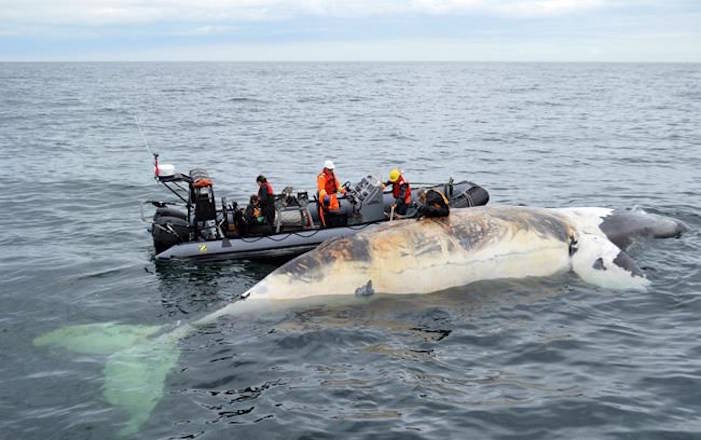Ottawa is changing the dates of Canada’s snow crab season and establishing a permanent speed limit in the Gulf of St. Lawrence in hopes of protecting the highly endangered North Atlantic right whale.
There are only about 450 of the whales left, and last summer at least 18 were found dead off the east coasts of Canada and the United States. Fisheries Minister Dominic LeBlanc says necropsies done on the 12 found in Canadian waters showed most had become tangled in fishing gear or hit by boats.
Related: B.C. Scientists witness first-ever documented killer whale infanticide
Scientists this week reported thus far
This year’s surveillance of the whales as they migrate north towards the Gulf for the summer has failed to spot a single newborn, scientists reported this week, adding to the concern surrounding one of Canada’s most at-risk mammals.
The lack of newborns underscores the need to make changes to the way ships and fisheries operate in the Gulf, LeBlanc told a news conference Wednesday.
“We don’t think it’s too late,” he said. “We think if we don’t act in a very robust way, we’ll set on course a very tragic outcome — and that’s why we’re here today announcing these measures.”
LeBlanc’s department is adjusting the dates of the snow crab season so it starts and ends earlier. The snow crab fishery will start as soon as possible, with the help of icebreakers and a hovercraft. The southern part of the Gulf, where most of the right whales were spotted last year, will be closed to fishing after April 28.
Related: Canadian snow crab imports threatened over whale deaths
Temporary closures will be enacted anywhere whales are spotted for at least 15 days, and the area won’t be reopened to fishing until at least two surveillance flights show no signs of whales.
All snow crab gear will have to be removed from the water by June 30, two weeks earlier than usual, and there will be lower limits for the number of traps allowed in certain areas.
Transport Minister Marc Garneau also says the speed limit of 10 knots imposed on large ships in the Gulf last year will be reinstated in the western part of the Gulf between April 28 and Nov. 15.
Two shipping lanes with normal speed limits will be kept open north and south of Anticosti Island as long as no whales are in the area, but limits will be imposed in those lanes if that changes.
LeBlanc promised a multimillion-dollar announcement in the coming weeks to allow snow crab fishers to test ropeless traps, using technology that allows the remote retrieval of traps from the ocean floor. The ropes that are traditionally used to retrieve traps are a frequent problem for the whales; removing them would eliminate a significant threat, he said.
“We don’t believe the measures we’ve announced today will have a serious economic disruption on the crab fishery,” LeBlanc added, noting most of the measures were recommended by the fishers themselves.
Related: Accidental deaths threaten endangered whale
The Canadian Press



